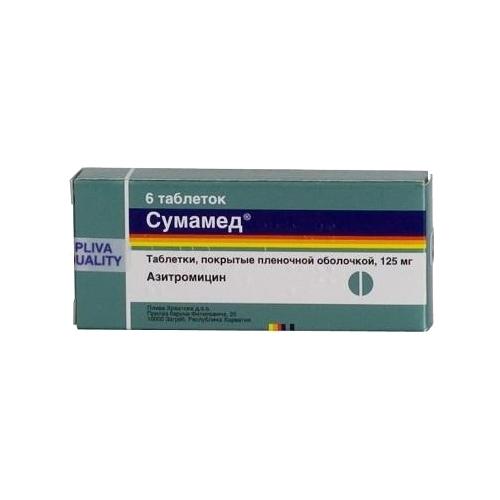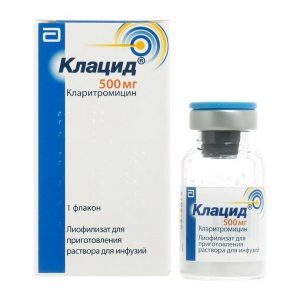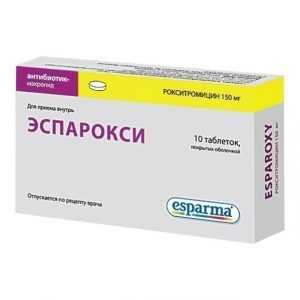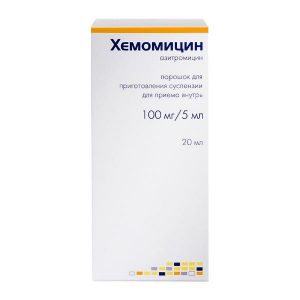Description
Release form
film-coated tablets.
Packing
6 pcs.
Pharmacological action
Sumamed – an antibiotic of the macrolide group – azalide. It has a wide range of antimicrobial effects. It binds to the 50S subunit of the ribosome, inhibits the biosynthesis of protein microorganisms. In high concentrations it has a bactericidal effect.
Azithromycin is active against gram-positive aerobic bacteria: Streptococcus pneumoniae, Streptococcus pyogenes, Streptococcus agalactiae, Streptococcus viridans, streptococci groups C, F and G, Staphylococcus aureus, Staphylococcus epidermidis bacteriaphyriform bacteria.
Azithromycin is active against gram-negative aerobic bacteria: Haemophilus influenzae, Haemophilus parainfluenzae, Haemophilus ducreyi, Moraxella catarrhalis, Bordetella pertussis, Bordetella parapertussis, Neisseria gonorrhoeae, Neisseria meningitidis, Helicobacter pylori, Gardnerella vaginalis, Campylobacter jejuni.
Azithromycin is also active against intracellular and other microorganisms: Mycobacterium avium complex, Legionella pneumophila, Chlamydia trachomatis, Chlamydia pneumoniae, Mycoplasma pneumoniae, Ureaplasma urealyticum, Listeria monocitogenes, Borrelia burgerferma burgfer.
Gram-positive bacteria resistant to erythromycin are resistant to the drug.
Indications
Infectious and inflammatory diseases caused by microorganisms sensitive to the drug: – upper respiratory tract infections and ear infections (bacterial pharyngitis, tonsillitis, sinusitis, otitis media)
– lower respiratory tract infections (bacterial bronchitis, interstitial pneumonia exacerbation of chronic bronchitis)
– infections of the skin and soft tissues (chronic migratory erythema – the initial stage, Lyme disease, erysipelas, impetigo, secondary dermatoses)
– infections, p redavaemye sexually (urethritis, cervicitis)
– diseases of the stomach and duodenum associated with Helicobacter pylori.
Contraindications
– severe impaired liver and kidney function
– hypersensitivity to antibiotics of the
macrolide group Precautions: during pregnancy and lactation, with impaired liver and kidney function, patients with disorders or predisposition to arrhythmias and lengthening of the QT interval.
Special instructions for
If you miss one dose of the drug, you should take the missed dose as soon as possible, and the next doses should be taken 24 hours apart
The patient should be warned about the need to inform the doctor about any side effect.
Composition
1 tablet contains azithromycin dihydrate 125 mg
Dosage and administration
The drug is prescribed orally 1 time / day. The bioavailability of the drug in tablet form does not depend on food intake.
Children 6 months of age and over are recommended to use the drug in the form of a suspension for oral administration or tablets of 125 mg
For infections of the upper and lower respiratory tract, skin and soft tissues (except for chronic migratory erythema), the drug is prescribed for adults at a dose of 500 mg 1 time / days for 3 days, the course dose is 1.5 g.
Children are prescribed at the rate of 10 mg / kg body weight 1 time / day for 3 days, the course dose is 30 mg / kg.
In chronic erythema migrans:
is prescribed for adults 1 time / day for 5 days: 1 day – 1 g (2 tablets of 500 mg), then from 2 to 5 days – 500 mg each, the course dose is 3 g. Children are prescribed 1 day at a dose of 20 mg / kg body weight and then from 2 to 5 days – daily at a dose of 10 mg / kg body weight, course dose of 60 mg / kg.
Side effects
Rarely (in 1% of cases or less).
From the digestive system: melena, cholestatic jaundice, nausea, vomiting, diarrhea, constipation, decreased appetite, gastritis, a reversible moderate increase in the activity of liver enzymes.
From the urinary system: jade.
From the reproductive system: vaginal candidiasis.
From the cardiovascular system: palpitations, chest pain.
From the side of the central nervous system and peripheral nervous system: dizziness, headache, vertigo, drowsiness, increased fatigue in children – headache (with treatment of otitis media), hyperkinesia, anxiety, neurosis, sleep disturbances.
Allergic reactions: skin rashes, Quincke’s edema, urticaria, conjunctivitis.
Dermatological reactions: photosensitivity, itching.
On the part of laboratory parameters: in some cases – neutrophilia, eosinophilia (changed indicators return to normal 2-3 weeks after discontinuation of treatment).
Drug interactions
Antacids (containing aluminum, magnesium), ethanol and food intake significantly reduce the absorption of azithromycin (capsules and suspension), therefore, at least 1 hour before or 2 hours after taking these drugs and food.
Azithromycin, unlike other macrolide antibiotics, does not bind to isoenzymes of the cytochrome P450 system. To date, there has been no interaction with theophylline, terfenadine, carbamazepine, triazolam, digoxin.
Macrolides with concomitant use with cycloserine, indirect anticoagulants, methylprednisolone, felodipine and microsomal oxidation preparations (cyclosporine, hexobarbital, ergot alkaloids, valproic acid, disopyramide, hypoxicity, hypotoxicity, antagonism, antagonism, antifungal, hypnoticity, hypnoticity, bromocyncipinemia, hypnoticity, drugs, while with the use of azalides, such an interaction has not been observed to date.
If co-administration with warfarin is necessary, careful monitoring of prothrombin time is recommended.
With the simultaneous administration of macrolides with ergotamine and dihydroergotamine, their toxic effects (vascular spasm, dysesthesia) may occur.
Lincosamines decrease, while tetracycline and chloramphenicol increase the effectiveness of azithromycin.
Pharmaceutically azithromycin is not compatible with heparin.
Overdose
Symptoms: nausea, vomiting, diarrhea, temporary hearing loss.
Treatment: symptomatic.
Storage Conditions
Keep out of the reach and sight of children at temperatures between 15 ° and 25 ° C.
The Expiration of
is 3 years.
Eff active substance
azithromycin
The dosage form of
tablet
Prescribing
Children over 3 years old, Adults prescribed by a doctor, Children prescribed by a doctor, Pregnant women prescribed by a doctor
Indications
Indications
From pharyngitis, From tonsillitis, From infectious diseases, Bronchitis, From pneumonia, From urethritis, From otitis, From tonsillitis, From infections, From tonsillitis, From infections ways, From sinusitis, From skin infections and, From cystitis




